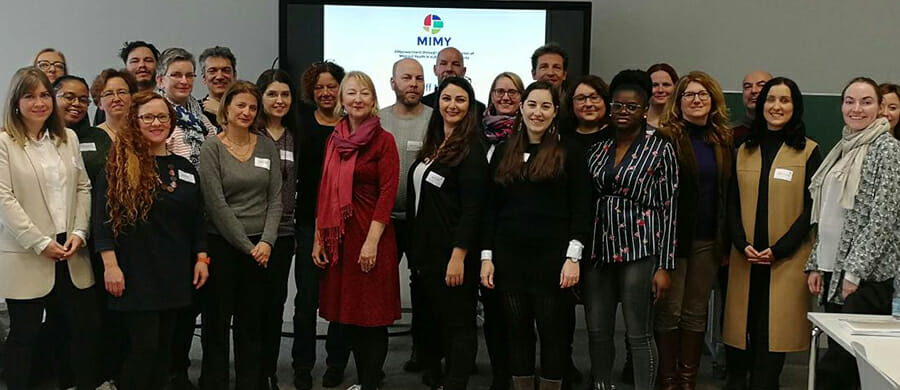Leibniz University Hannover
Prof. Dr. Silke Ospelkaus-Schwarzer (Institute for Quantum Optics) Prof. Dr. Philipp Heretsch (Institute for Organic Chemistry)
DATA & FACTS
Project
Hochdotierte EU-Förderung: Zwei neue ERC Consolidator Grants für innovative Forschung
Scientific contact
Prof. Dr. Silke Ospelkaus-Schwarzer Prof. Dr. Philipp Heretsch
EU-Funding line
ERC (Horizon Europe)
Projektleitung: Prof. Dr.-Ing. Arno Kwade
Projektname: „Li-Ion Pilot Lines Network“ (LiPLANET)
Keywords: Energie, Mobilität, Partner
Prestigious EU funding: Two new ERC Consolidator Grants for innovative research
LUH professors Silke Ospelkaus-Schwarzer and Philipp Heretsch receive EU grants
Research on complex quantum systems and new chemical insights into terpenes: Two researchers of Leibniz University Hannover (LUH) have each been awarded one of the internationally coveted ERC Consolidator Grants. The funding line of the European Research Council (ERC) addresses researchers with seven to twelve years of experience since completion of their doctoral degree whose independent research group is currently in the consolidation phase.
Grant holders receive approximately two million euros of funding over a period of five years. ERC Consolidator Grants provide funding for excellent junior researchers at the beginning of an independent career, support researchers during innovative projects and assist them with extending their work group.
At LUH, Prof. Dr. Silke Ospelkaus-Schwarzer (Institute of Quantum Optics) and Prof. Dr. Philipp Heretsch (Institute of Organic Chemistry) have been awarded funding. Professor Ospelkaus-Schwarzer has previously been awarded an ERC Starting Grant, a funding line for junior researchers with two to seven years of experience since completion of their doctoral degree.
TriTramo – Complex quantum systems at ultracold temperatures
The work group of Prof. Dr. Silke Ospelkaus-Schwarzer focuses on one of the biggest challenges in modern atomic and molecular physics – preparing and controlling increasingly complex physical systems in all quantum mechanical degrees of freedom. Control is mostly achieved by preparing physical systems at temperatures close to absolute zero. Around ten years ago, researchers first succeeded in preparing and controlling diatomic molecules at ultracold temperatures based on the precise control of atomic systems.
The funded project TriTramo (trimers, tetramers and molecular BEC) aims to realise the next milestone on the way to increasingly complex quantum systems at ultracold temperatures. By precisely controlling collisions of diatomic molecules, they can be cooled down further. If successful, a Bose-Einstein condensate can be produced from molecules, which can be used to discover and analyse new quantum phases due to dipolar interactions between the molecules. Moreover, collision processes and light is used to produce and control small polyatomic molecules – trimers and tetramers – from diatomic molecules under controlled conditions in order to gain a better understanding of their properties. The system provides new insights into the structure of simple molecular systems.
RadCrossSyn – Efficient chemical approaches to terpenes
Within the scope of his project RadCrossSyn (Radical and Radical-Polar Crossover Logic in Terpenoid Synthesis), Prof. Dr. Philipp Heretsch conducts research on the largest class of secondary natural products, terpenes. They are involved in numerous interactions between organisms – both on a microscopic cellular level and on a macroscopic level, thus, between living creatures. New technologies and methods for synthesising these highly complex molecules will play an even more important role in the future, such as in drug development in the context of combating pandemics.
Professor Heretsch and his RadCrossSyn team intend to develop efficient chemical approaches to terpenes. For this purpose, they will challenge a dogma of their biogenesis, the way these connections are produced naturally. Instead of the conventionally presumed ionic ways, the researchers will investigate alternatives involving radicals. They aim to overcome this boundary in order to combine ionic and radical reactivity, create efficient and sustainable approaches to terpenes as well as to formulate propositions for future assumptions on biogenesis. Perhaps even nature is able to overcome this boundary between radicals and ions through refined interactions? Finally, the resulting terpenes and their derivatives will be analysed in collaborations in order to determine their biological and medical potential.
Due to the tough selection process, ERC Grants are considered the highest accolade awarded by the European Research Council. Important selection criteria include visionary research topics as well as excellent achievements that the applicants have accomplished to date.

Date:
17.03.2022
this might also interest you…

Project: MIMy
HAWK joins interdisciplinary consortium aiming to improve integration policies across Europe. The EU research project MIMY aims to improve the situation of young migrants in Europe via a multi-level analysis of their integration processes. The interdisciplinary and international consortium…

Project: CHANGING DIRECTION
The project “Changing direction” (Kurswechsel) took place from 2020 to 2022, providing support for refugees preparing to enter the job market in Germany. The project offered the opportunity to rediscover one’s own skills with an experienced team, to prepare oneself sustainably for entering the labor market…
